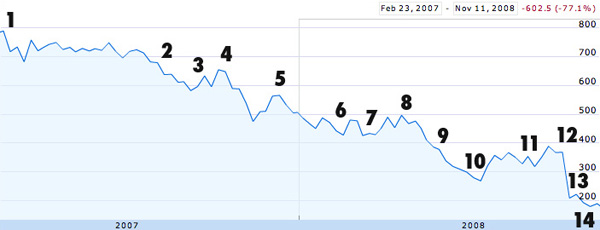Some great reads from around the web.
Again and again during the four-year financial crisis, we’ve had to get to grips with complex ideas that have eventually been so well-understood that we wonder why our 96-year old grannie didn’t raise the alarm.
We all now see why sub-prime mortgages blew-up, for example. What were they thinking? Yet at first it was a jumble of new acronyms (MBS, CDS, AAA, ETC) and labyrinthine banking lore.
Europe’s woes are now putting us through a similar wringer.
Currently the class is stuck on the reluctance of Germany to bail out its hapless neighbours. We’ve already learned it’s in Germany’s interest to do so, and we have heard that the Germans are culturally afraid of inflation, but the narrative hasn’t yet become everyday fodder on the Clapham Omnibus.
But after reading my post of the week from the Psy-Fi blog, your 96-year old grannie will find it a doddle to explain the situation to the other ladies in her quantum physics club.
Author Timmar writes:
Yoking Germany and Greece together in an economic union with a common currency ensured that the interest rates Greece paid dropped to the same level as that of Germany. This was because of something called “convergence”, the concept that all of the Eurozone countries were financially equivalent.
This is the kind of idea that bond markets have when isolated from the real-world and fed too much coffee.
He goes on to explain why the history of Germany makes redressing the fall-out so difficult, concluding:
The Eurozone has benefited no country more than Germany and for it to continue then the massive trade surpluses run by Germany as a result of this need to be redistributed across the other countries in the union. Otherwise the whole scheme is just a way of impoverishing the rest of Europe – which, ultimately, will be felt in the falling earnings of German companies.
Of course, the psychology of the situation makes this virtually impossible. The haunting fear of inflation means that the only possible solution, to German minds, is that Greece and the rest of the spendthrift nations must obey the rules and become German clones. That this is both physically and mentally impossible is the festering canker at the heart of European union.
It’s a super article from a great blog. It’s also pretty downbeat – unnerving if like me you expect the Germans to bow to the inevitable eventually.
I respect the awful historical precedent that the Germans are battling against, but these two situations are hardly the same.
Perhaps they’ll read Timmar’s easy-to-follow post and see that, too.
From the money and investing blogs
- Liquidity problems with corporate bond ETFs – Rick Ferri
- Understand and then destroy your heating bill – Mr Money Moustache
- I’m afraid of a bond bubble… – Oblivious Investor
- …and dividend-paying stocks are not bonds – Vanguard blog
- Dominoes and deleveraging – Investing Caffeine
- Early retirement is about spending less – Simple Living in Suffolk
- 7 money skills my immigrant parents taught me – Len Penzo
- Assessing the fall-out from Carl Richards’ money blunders article – Kitces
- Retirees can accept running out of money [Research] – Wade Pfau
Deal of the week: Daniel Kahneman’s work on human psychology has been a popular subject on Monevator in the past, so you might want to check out his brand new book, Thinking, Fast and Slow.
Mainstream media money
- An inside look into pricing a turkey – The New York Times
- Investing in markets that are in sync – The New York Times
- Unleash the American dividends – Motley Fool
- Merryn [like me] says Europe is not Japan – FT
- Multi-manager funds disappoint [I’m shocked. Shocked] – FT
- More moves to limit vast fund management fees – FT
- A new dividend-tracking ETF, but it’s US-listed – FT
- Check what bonds your bond fund holds – FT
- Why you must confront the impact of inflation – Telegraph
- 1.4 million extra people to pay higher-rate tax – Telegraph
- Baby boomers versus Generation X – Independent
- FSA issues a fresh land banking scam warning – Independent
- Richard Branson’s new ‘Capitalism 24902’ – The Guardian
- Your gripes with Groupon – The Guardian
Subscribe to get these links every week.







